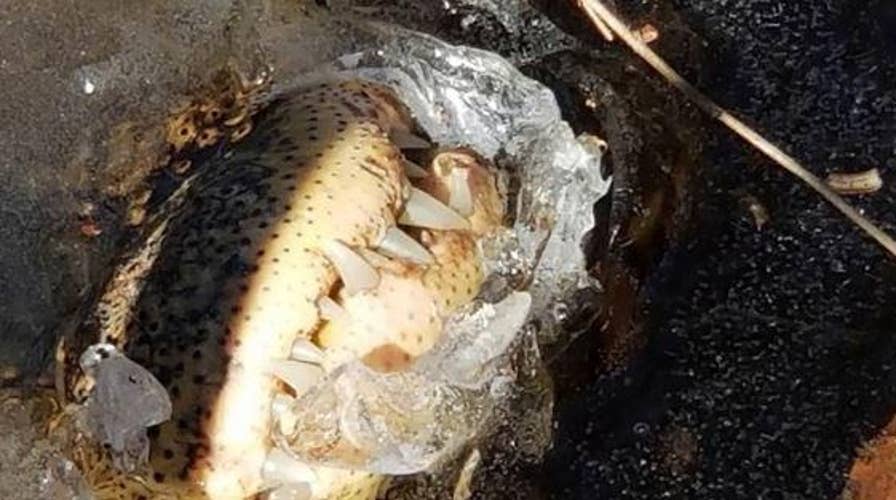Innovative survival methods kick in for alligators in a freezing North Carolina swamp
Innovative survival methods kick in for alligators in a freezing North Carolina swamp as they survive a cold snap by freezing themselves in place with their noses above the ice.
In a bizarre and instinctual survival tactic, alligators that normally lurk in a swamp in eastern North Carolina are now "frozen" beneath the murky water. Every inch of the reptiles’ bodies stay underwater — except for their snout.
Officials at The Swamp Park in Ocean Isle Beach took to Facebook this week with a video that shows the gators icebound in the swamp with only their snouts protruding and a toothy grin sealed in place.
HUGE PYTHON IN TOILET GIVES AUSTRALIAN FAMILY A 'FRIGHT,' SHOCKS LOCALS: 'MY WORST NIGHTMARE'
“All our alligators in ice here,” George Howard, the manager at The Swamp Park, says in the video which had 12,000 views as of Thursday afternoon. “Eighteen American alligators are thinking ahead, as they poke their noses through the ice.”
The gators use the tactic to survive when the water around them reaches freezing temperatures in the frigid winter months.
When they sense the water is reaching a freezing point, they push their snouts just above the surface “at just the right moment” Howard told The Charlottesville Observer last year when a similar event occurred. Alligators, like other reptiles, are cold-blooded and “rely on their environment for temperature regulation,” the South Carolina Aquarium explains.
The process is known as brumation, according to Loyola University New Orleans’ Center for Environmental Communication. Brumation — similar to hibernation but not to be confused with it — occurs when the alligators “react to a cold environment by slowing their metabolic activity, but certainly not to the deep torpor of true hibernation,” the center explained.
Animals that hibernate fall into a deep slumber and do not eat or drink for months. In brumation, reptiles still have periods where they are active and they do not fall into a deep sleep. While they do not eat during this time, they do drink to avoid becoming dehydrated, according to the South Carolina Aquarium.
Brumation typically lasts for four or five months.
Seeing alligators frozen in water — especially in the South when freezing temperatures aren't as common as in other parts of the country — makes this phenomenon even more unique, Howard told Fox News on Thursday.
Normally, he said, alligators in the wild "would burrow into the ground" as a form of brumation. But because this particular group of lives in captivity at the park, "they have to change the way they're doing it."
"They can't move. They stay suspended [while frozen.] It’s really a fantastic phenomenon because it hardly ever freezes here," he added, noting the amount of time the animals remain frozen depends on the weather.
When the gators froze at The Swamp Park last year — the first time officials at the park saw this occur — they remained frozen for a few days before thawing, The Charlottesville Observer reported at the time.





















